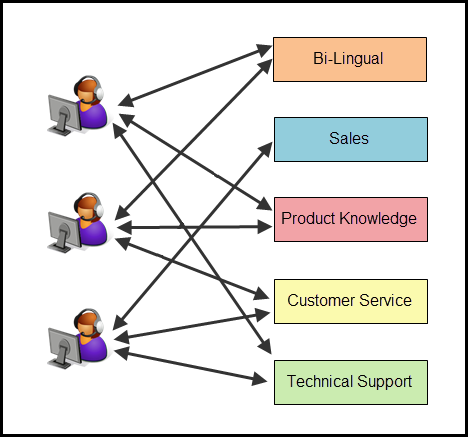- Contents
Interaction Dialer Manager Help
Skills-Based Dialing and Routing
Skills-Based Routing vs. Skills Based Dialing
How Skills-Based Dialing Works
Skills-Based Dialing and Call List Sorting
Configure Skills-Based Dialing
This section explains the difference between skills-based dialing and skills-based routing. It helps you understand Dialer's skills-based dialing process, which is more effective than ACD routing alone.
Skills-Based Routing vs. Skills Based Dialing
One feature that makes CIC so effective in the contact center environment is the powerful Automatic Call Distribution (ACD) system. In the inbound center, matching agents with interactions that use their specific skill sets provides not only shorter talk times, but also produces more efficient interactions and greater customer satisfaction.

Skills-Based Routing involves an already connected call. Skills are associated with interactions (required skills) and with agents (available skills). The ACD subsystem matches these skills up to route an interaction to the best available agent. Dialer can use ACD-based skills-based routing to route a live caller to the best available agent.
Skills-based routing works well in a predictive or power dialing environment when all agents have the skill(s) and can accept the call. It does not work as well, however, when skills are used to select from a subset of agents, that is when a call requires a specific skill set that is possessed by only certain members of the group. This latter use of skills-based routing can result in excessive abandons and a poor dialing experience, especially if no one from the required subset is available when the call connects. The solution is to use skills-based dialing instead.
Skills-Based Dialing is available for preview, power, and predictive campaigns. To understand this feature, it is important to differentiate between skills-based routing and skills-based dialing. Skills-based dialing looks ahead to choose contacts to be dialed:

Skills-based dialing selects only contacts in the call list that can be handled by the available agent pool. Skills are evaluated before contacts are dialed. The mixture of contacts' required skills and agents' anticipated availability and skills is dynamic and must be managed similarly to pacing. Some examples of outbound situations in which only a subset of agents will have a skill include:
-
State-based licensing—wherein lenders and insurers must be licensed in states into which they are attempting to sell.
-
Specialized selling or collections—when a subset of agents are trained or allowed to handle particular products or customers.
-
Language skills—when the contact has special language requirements.
Once a contact with an appropriate skill requirement is selected to be dialed and a live person contacted, that contact's skills are associated with the connected call. The call is then routed to the most appropriate available agent using skills-based ACD routing.
Note: When skills-based dialing is used, contacts with null skill values are never dialed.
-
Skills-based routing is based on several elements (depending on the type of ACD queue selected.) Common attributes include skill level, cost (agent), priority (interaction), and time available. Agents and interactions collect points for each configured element, and the agent/interaction with the overall highest score is selected.
-
Skills-based dialing focuses on agent skill proficiency and predicted availability. Dialer uses sorting and skill requirement to filter agents who are eligible/ineligible to process a specific contact call.





